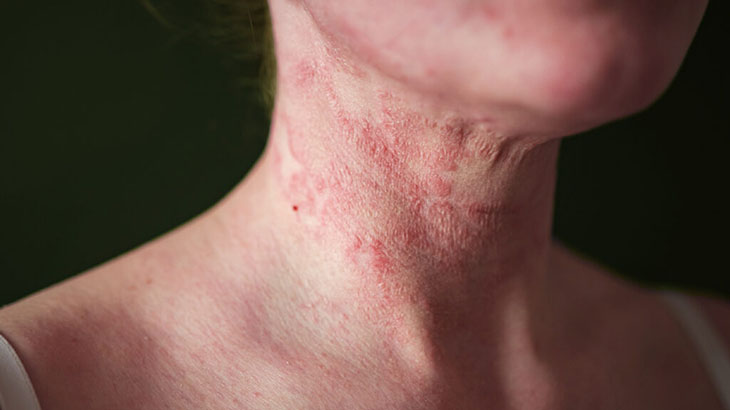
A groundbreaking new guideline has been released by the American Academy of Dermatology. Their report highlights a range of health issues that may be connected to eczema. Those who suffer from it may need to be on the lookout for hay fever, asthma, osteoporosis, depression, alopecia, and chronic hives.
Eczema and Possible Links
People who suffer from atopic dermatitis, or what is more known as eczema, may observe that this inflammation of the skin is just one of the health conditions they need to deal with. Dermatologists are already familiar with the link between eczema and other health concerns. The American Academy of Dermatology (AAD) has already evaluated data from several studies made. They were able to create an official guideline that was released at the beginning of the year.
The they came up with analysis was published in the Journal of the American Academy of Dermatology last January. In it, they talk about the solid evidence they found and tied this atopic dermatitis in adults to several diseases and conditions such as hay fever, asthma, food allergies, alopecia (sudden hair loss), chronic urticaria (hives), osteoporosis, mental health disorders such as depression, and some skin infections.
As for substance abuse disorder, ADHD (attention deficit hyperactivity disorder), and metabolic syndrome (which is a group of five conditions that can lead to heart disease, diabetes, stroke, and other health problems), the authors of the study have also identified evidence that have connected these varying issues to eczema.
Furthermore, the report also suggested the connection between atopic dermatitis and various cardiovascular issues. However, this wasn’t treated as something major. Evidence that supports a link between eczema and autism spectrum disorders, heart attack, and stroke was also lacking and inconclusive.
The lead author of the guideline is Dawn Davis, MD. She is a dermatologist at the Mayo Clinic. With the findings the guideline shows, she says that the AAD guideline is “groundbreaking” because this is the first paper of its kind to give a thorough and comprehensive review. They elaborate in deeper detail how eczema may be linked to various physical and mental problems.
“We are realizing more and more that inflammatory skin disease — such as atopic dermatitis and psoriasis — are not only skin conditions, but rather affect the entire person,” elaborated Dr. Davis. She also said, “So we need to practice whole-person care. This guideline is created to empower patients, and to empower the medical community to help patients better address their skin needs.”
Eczema’s Connection to Food Allergies, Hay Fever, and Asthma
For years now, dermatologists have known about the connection between eczema and other atopic and allergic conditions. “Atopic” already is indicative of the association to allergies. MedlinePlus says that up to 60 percent of those who have atopic dermatitis develop asthma or hay fever (or allergic rhinitis) in the latter part of their lives, and up to 30 percent of them also suffer from food allergies.
Eczema oftentimes signals the start of a progression of allergic diseases that are referred to as “atopic march” or “allergic march.” Once eczema sets in, a typical pattern can be expected. The patient then develops food allergies, then hay fever, and lastly, asthma.
The AAD guideline that has been recently released discovered how about a quarter of adults with eczema had asthma. They were at risk three times more to suffer from this inflammation of the airways than the rest of the world.
The research they made also highlights evidence that suggests how asthma in children ages 7 to 11 was linked to a more tenacious type of eczema. There are targeted biologic therapies for this such as dupilumab (Dupixent). All these showed a potential benefit for both the severe atopic dermatitis and for asthma.
“Dupilumab has been approved for asthma and eczema because both of these diseases kind of work through the same pathway and cause inflammation,” said Karan Lal, MD, the committee chair for the Society for Pediatric Dermatology. She also said, “It’s possible if we’re treating eczema with dupilumab at a very early age, we may prevent [children] from developing clinical signs of asthma.”
As for the many types of food allergies, researchers made an estimate and said that just over 1 in 10 individuals with eczema were likely to suffer from this. They didn’t really clarify what the implications are, but they said that patients often ask whether food allergies serve as triggers for their condition and if they need to be tested for these food allergies.
The AAD team also observed a persistent connection between allergic rhinitis and eczema. However, there wasn’t much data that demonstrated the relationship to allergic conjunctivitis (inflammation of eye tissue) and eosinophilic esophagitis (inflammation of the esophagus). “We always suspected and knew in practice that asthma, food allergies, and other atopic diseases such as allergic rhinoconjunctivitis were more common in patients with eczema, but now we have research data to support those conclusions,” explained Davis.
Eczema’s Connection to Alopecia (Hair Loss) and Chronic Urticaria (Hives)
Davis also pointed out how the study confirmed that certain skin diseases are more common in atopic dermatitis patients. An example of which is alopecia areata. This is an autoimmune disease in which the immune system starts to attack the hair follicles. As a result, this brings about sudden hair loss that results to bald patches on the head. This has also been shown to affect the other parts of the body.
The guideline also showed data that demonstrated a strong association between eczema and the autoimmune condition called chronic urticaria (hives). Generally, if you suffer from eczema, you’re 2.5 times more likely to suffer from an autoimmune condition as well. This was clearly stated in the report.
Eczema’s Connection to Depression and Substance Abuse Disorders
This analysis drew in from a pool of four studies. Included here are 11,244 adults with eczema and 149,713 people without. They found that those with eczema faced twice the chances of self-reported or clinician-diagnosed depression. The researchers also found that eczema patients were more predisposed to consider suicide. However, it must be noted that evidence that links this to actual death by suicide was not well established.
As to why they are more inclined to suffer from mental health issues, the panel of AAD believes that itching, poor sleep, and decreased quality of life overall may eventually take a toll, and thus, making this a major role to consider.
Although some research also established the link between substance abuse and eczema, the evidence they gathered had been limited. They weren’t able to fully establish the connection between the skin condition and alcohol use or cigarette smoking. Davis and her collaborators underscored how ADHD and autism spectrum disorders are better done with children instead of adults. There will be a pediatric guideline that explore these connections further and more elaborately.
Eczema’s Connection to Cardiovascular Diseases
Atopic disease patients have shown an increased levels of blood proteins that is linked to cardiovascular risk. As a matter of fact, systematic inflammation is an established risk factor for cardiovascular disease. It may be likely that treatments that manage inflammatory skin diseases such as eczema could decrease the chances of developing heart issues.
The research also found a slight link between eczema and hypertension, peripheral and coronary artery disease, congestive heart failure, and other medical events such as myocardial infarction and cardiovascular death.
The data collected also suggested a small link between eczema and obesity and dyslipidemia. The latter refers to an imbalance of lipids such as cholesterol. Still, they were able to gather facts from eight cross-sectional studies and saw that eczema patients were 36 percent more likely to suffer from obesity and 13 percent more likely to suffer from high cholesterol.
The guideline authors stressed how atopic dermatitis may actually have an inverse relationship with diabetes. There are some studies that suggest how individuals generally have a lower risk of diabetes, type 2 diabetes to be specific. Based on the data, however, Davis also stressed that patients with eczema may face a greater likelihood of metabolic syndrome by and large.
Eczema’s Connection to Osteoporosis
Davis and her team went on to highlight an investigation that showed an increased risk of osteoporosis for those who have eczema. They also made a separate study. This showed an increased likelihood of bone fracture. For those who suffer from severe atopic dermatitis, the possibility of fracture due to osteoporosis was so much more.
Of course, they acknowledged the fact that more research is required so that they can truly comprehend the mechanisms that work behind this link. There are explanations, though, suggesting that chronic systemic inflammation may pose negatively on bone metabolism, and when this happens, there is increased bone loss.
Eczema’s Connection to Skin Infections
The link between eczema and staphylococcal skin infections is also known by experts. The guideline created highlights a study from the United Kingdom. The said study indicates that herpes superinfection is twice as common for those with eczema. Other data also linked cutaneous infections, bacterial skin infections, and eczema herpeticum, a condition that brings about a painful, blistering rash because of the herpes simplex virus. These will more likely occur among those with eczema.
Will the Guideline Require Dermatologists to Change Their Treat Plans for Eczema Patients?
While Golara Honari, MD is a dermatologist with Stanford Medicine. She sees the importance of raising awareness about eczema’s connection to other diseases. She stresses on the importance of how both patients and doctors need to interpret these correlations carefully.
“We need to learn more about these conditions in relation to atopic disease,” said Dr. Honari. She used cardiovascular disease as examples. “There are other common skin diseases — for example, psoriasis — that have really solid evidence for increased risk of cardiovascular disease, but for atopic dermatitis, that evidence is still not very solid.”
“We’re putting together associations, but we have to be careful, because I don’t think these associations necessarily lead to clinical correlations,” added Dr. Lal. “Do the results in the guideline mean that for patients that come in, I have to screen all my patients for metabolic syndrome because they have a diagnosis of eczema? It doesn’t really work like that.”
All in all, Davis and her colleagues see the new guideline as a tool for education. This wasn’t meant to stir fear among the readers. “When we know certain diseases are interrelated, then we can work on monitoring for those diseases and screening for them, and we can work on lifestyle modification factors that can alter the risk of a disease course,” she stated.



